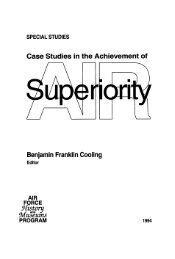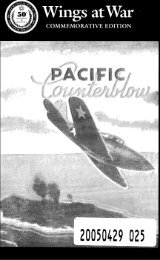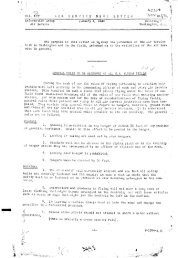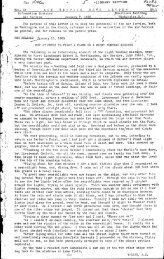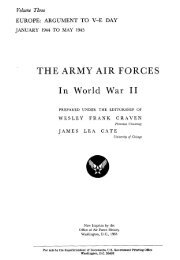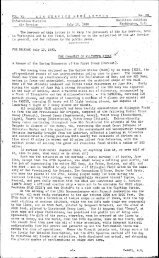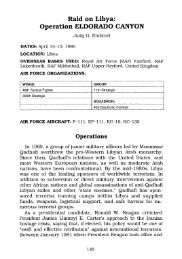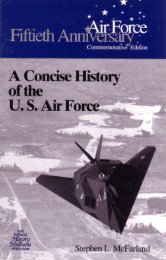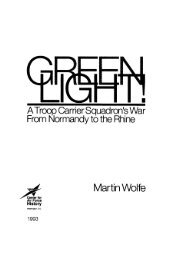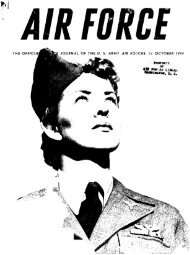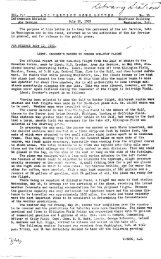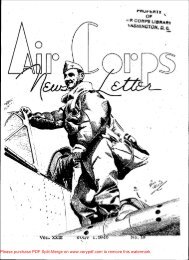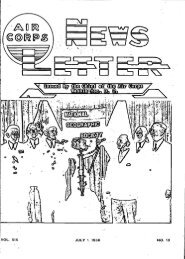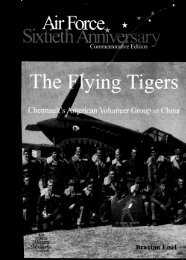News Letter 1941 Jul-Dec - Air Force Historical Studies Office
News Letter 1941 Jul-Dec - Air Force Historical Studies Office
News Letter 1941 Jul-Dec - Air Force Historical Studies Office
Create successful ePaper yourself
Turn your PDF publications into a flip-book with our unique Google optimized e-Paper software.
AMERICANS<br />
ABROAD<br />
U. S. :PilotsWith the Empire <strong>Force</strong>s<br />
WITH THE R. A. F. ~ ~ ,-' WITH THE R' C. A. F.<br />
By Lieut. ]. B. Holst ~~<br />
By Lieut. Reed R. De Rauen<br />
~~<br />
When asked how many of us were in the group which<br />
came to the Royal <strong>Air</strong> <strong>Force</strong> from the <strong>Air</strong> <strong>Force</strong>s as<br />
observers, my answer was thirteen. All the RAF<br />
pilots expressed ama%ement at our apparent lack of<br />
superstition. It was always amusing to see the<br />
reactions to that answer. But at the time of this<br />
writing all of us have returned safe and sound to<br />
the good old.U.S.A.<br />
Mos t of u. exper ienced a 'bombing or two and some<br />
went through real blit%es. None suffered any injury<br />
except the author and that during the blackout<br />
when riding on the back of a motorcyc.le driven by<br />
~ absentminded Canadian who tried to pass a truck<br />
on the left side instead of the right. Water on<br />
the knee is not much fun, but the knee eventually<br />
becomes usable again.<br />
MY friend. expected me to return starved to the<br />
point of collapse. The idea that most Americans<br />
have about the terrible food shortage in England<br />
is all wrong. On the contrary, we had four meals<br />
a day: breakfast, lunch, tea and dinner. Of course,<br />
I'll admit that one does become tired of eating<br />
cabbage and potatoes three times a day, in spite<br />
of the fact tha t when se rved for breakfas t mixed<br />
together and fried it is called "bubble and squeak."<br />
There are plenty tt such breakfast foods as shredded<br />
wheat and corn flakes, but eggs are practically nonexistent<br />
and butter a thing of the past. It was<br />
suggested that a man with a little business acumen<br />
and a few thousand chickens could make a killing in<br />
England, but, then, there is no grain to feed the<br />
chickens.<br />
Even though the food in the officers' messes and<br />
in the average man's home was rather limited with<br />
respect to variety, practically any dish could be<br />
obtained in most ..of the better restaurants and<br />
clubs in London--even fresh peaches at three shillings<br />
six pence each, which at the present rate of<br />
exchange amounts to about seventy cents.<br />
Living expenses were negligible as long as we<br />
stayed on the station because, since the war, the<br />
pay of the officers in the RAF has b~encut about<br />
in half~ Naturally, a man cannot be expected to<br />
pay more than he earns just for living expenses.<br />
Living in town, on the other hand" would cost more<br />
than it would in the States because of heavy taxes<br />
on everything.<br />
(Cont inue" on Next P•• e)<br />
27<br />
My experiences with the Royal Canadian <strong>Air</strong> <strong>Force</strong><br />
began shortly after I ieft the United States Army<br />
<strong>Air</strong> Corps as a flying cadet in October, 1940. I<br />
had -washed out"after five and a half months<br />
training here and to keep flying I enlisted in the<br />
R.C.A.F. at Ottawa, Ontario.<br />
Entrance requirements for the R.C.A.F. are virtually<br />
the same as they are here with the exception<br />
the British require airmen to have only one year of<br />
college work which is taken in high school and is<br />
referred to as ..senior matr ic ...<br />
In the.British air force all enlistees, both for<br />
air and ground crews, are rated AC2, aircraftsmen<br />
second class, similar toour private's rating. Men<br />
who cannot pass the physical. or mental requirements<br />
for air work are assigned to ground crews. Uniform<br />
worn by both groups is exactly the same except for<br />
a white cloth insignia attached to the overseas<br />
cap of the airmen.<br />
After enlisting I was sent to Toronto's No. 1<br />
Manning Pool, an air force reception center. A<br />
group of us arrived at Manning Pbol at 1 A.M. and<br />
found the outside cold and deserted, although the<br />
interior literally bu%%ed with activity.<br />
Processing began immediately and by reveille we<br />
had gone through the mill, taking typhoid shots,<br />
smallpox vaccinatio~ and drawing our complete uniform<br />
kit. Next day we discovered that Manning<br />
Pool was a huge mi1i ta!y encampment built on the<br />
site of the Canadian National Exhibition Grounds.<br />
Approximately 6,000 air force men were lodged in<br />
the coliseum, which was partitioned off for sleeping<br />
quarters, mess hall, medical anddentai clinics,<br />
supply rooms and a central tanbark area for drill.<br />
For 10 days we were given close order army drill<br />
and then were sent to Eglington Hunt Club, No. 1<br />
Initial Training School, on the other side of<br />
Toronto. There men were qualified as pilots, gunners<br />
and observers by a series of examinations and<br />
short courses in visual Link Trainers, coord ina tion<br />
tests, the Banting Altitude Chamber Test, originated<br />
by the late Sir Frederick Banting, who was<br />
killed recently while on a flight from Canada to<br />
Xngland, and a mathematics test including solid<br />
geometry and a Lge br a , Many of the fellows purposely<br />
failed to get good &%a



